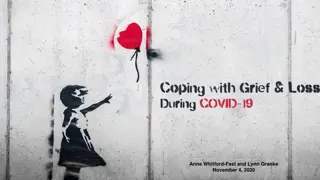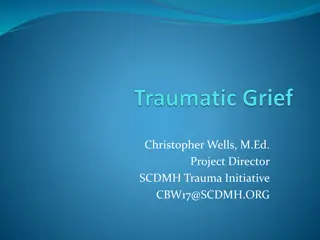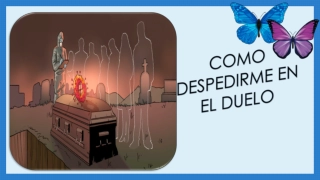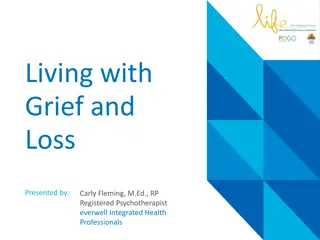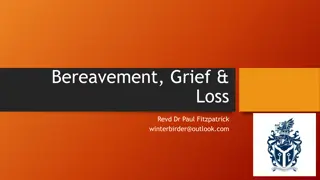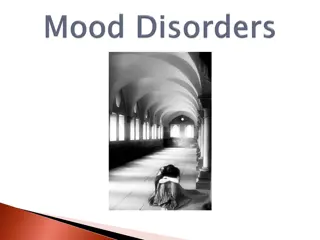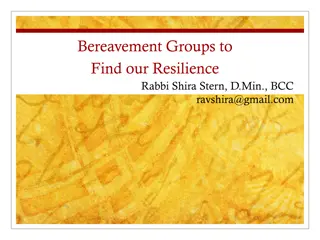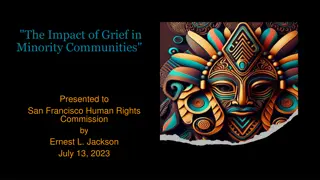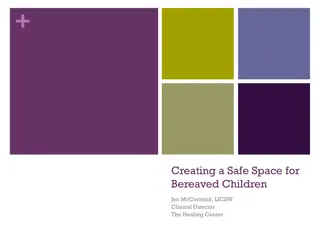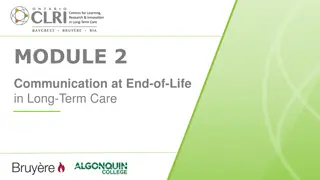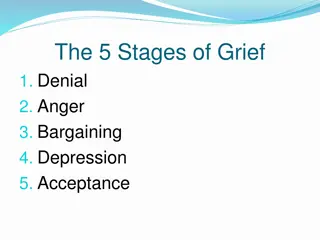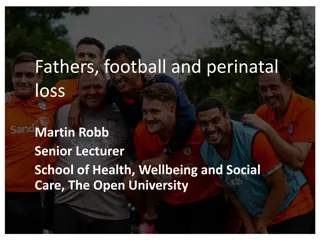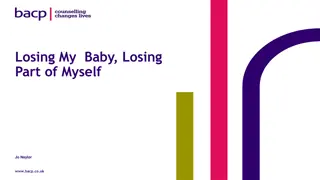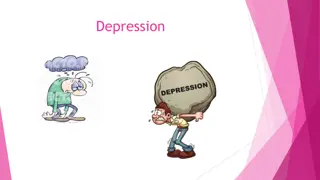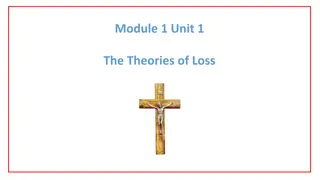Understanding Grief and Loss: A Spiritual Perspective
Exploring the different facets of grief and loss, this content delves into definitions, types of loss, the grieving process, and responses to grief. Touching on the stages of grief and the emotional complexities involved, it offers insights on how to navigate this challenging journey with spiritual care partners.
Download Presentation

Please find below an Image/Link to download the presentation.
The content on the website is provided AS IS for your information and personal use only. It may not be sold, licensed, or shared on other websites without obtaining consent from the author. Download presentation by click this link. If you encounter any issues during the download, it is possible that the publisher has removed the file from their server.
E N D
Presentation Transcript
Grief and Loss Spiritual Care Partners
The friend who can be silent with us in a moment of despair or confusion, who can stay with us in an hour of grief and bereavement, who can tolerate not knowing, not curing, not healing...that is a friend who cares. - Henri Nouwen, Out of Solitude
Definitions Grief: The physical, cognitive, emotional, and spiritual reaction to the loss of someone or something in whom one has been deeply invested. Mourning: The outward expression of grief. Grief gone public. Bereavement: The state of loss resulting from death. Anticipatory Grief: Grief that is experienced before a loss actually occurs, as in the case of terminal illness. - Smith, 2015
Types of Loss Death Loss of occupation/job Medically-related: for example, loss of a limb Loss of property/possessions Loss of relationship What else? Group Discussion
The Process of Grief Grief will often resurface or intensify on certain occasions. Grief lasts longer than most people think, and we are never over it. Grief is a process, not an event. - Holidays, birthdays, anniversaries, etc. Each person s grief is unique. A loss usually resurrects past losses, old issues, and unresolved conflicts. It is common to feel disoriented and off- kilter. There are no timetables, no predictable, orderly stages. Grief will be experienced physically, cognitively, emotionally, socially, spiritually. - Smith, 2015
The worst days now are holidays: Thanksgiving, Christmas, Easter, Pentecost, birthdays, weddings, January 31,---days meant as festivals of happiness and joy now are days of tears. The gap is too great between day and heart. Days of routine I can manage; no songs are expected. But how am I to sing in this desolate land, when there s always one too few? Nicholas Wolterstorff, Lament for a Son
Stages of Grief The Upward Turn Shock/Denial/Disbelief Reconstruction and Working Through Pain and Guilt Anger and Bargaining Acceptance and Hope Depression, Reflection, Loneliness - Drake, 2010
Responses to Grief Physical Muscle pain, loss of appetite/digestive problems, nausea, low energy, irregular sleep, sensitivity to noise, etc. Cognitive Short-term memory and decision-making problems, disorientation/confusion, inability to concentrate, etc. Emotional Shock, numbness, denial/disbelief, searching/yearning, anxiety/panic/fear, explosive emotions: anger, hate, blame, resentment, rage, jealousy Guilt, regret, sadness/despair, relief/release - Smith, 2015
Responses to Grief Social May need to be alone or fear being alone; loneliness, changes in friendship dynamics, awkwardness/unhelpful responses from others Disinterest in usual activities Spiritual Belief that having faith means that one doesn t need to mourn Faith being shattered or deepened/renewed Anger towards/distance from God Faith may or may not be source of strength Questions: Is there a God? How does a loving God allow bad things to happen? Why me? What is the meaning? Where is my loved one now? - Smith, 2015
Responses to Grief Disorientation Sudden changes in mood, feeling helpless/powerless Grief attacks, crying/sobbing, time-distortion Re-thinking/re-telling story Dreams - Smith, 2015
Six Needs of Mourning 1) Accept the reality of the death. 2) Let oneself feel the pain of the loss. 3) Remember the person who died. 4) Develop a new self identity. 5) Search for meaning. 6) Let others help you now and always. -Wolfelt, cited in Smith, 2015
Reconciliation/Healing Reconciliation and healing in grief occur when we open to the experience of all our feelings, and embrace and express the pain. As we do the very hard work of grief, hopefully surrounded by compassionate people and God s loving presence, we are gradually able to integrate the new reality of moving forward in life without our loved one. - Beth Smith, 2015
Spiritual Care Avoid: Offering platitudes and clich s: Just give it time, God never gives us more than we can handle, etc. Saying I understand Offering advice unless asked for it Shifting focus of conversation to your story when there are commonalities between stories Attempting to bring patient s grief to resolution
Spiritual Care Do: Use reflective listening skills. Focus on empathy: Hold the pain with patient for a little while. Accompany, walk alongside Honor silence: Use words sparingly and only for purpose of helping patient tell his/her story
Spiritual Care Do: Allow patient to feel how needs to feel Pray only if right timing or requested Refer to a chaplain if needed
What I need to hear from you is that you recognize how painful it is. I need to hear from you that you are with me in my desperation. To comfort me, you have to come close. Come sit beside me on my mourning bench. - Nicholas Wolterstorff, Lament For A Son
Sources Smith, B. (2015). Understanding Grief: Essentials of Caring for the Bereaved [PowerPoint slides] *(A special thanks to Beth Smith, Bereavement Coordinator for Bon Secours Hospice, for allowing us to use her material for this didactic.) Drake, Allyson England. Richmond s Bereavement Resource Manual (2018). Published by: Full Circle Grief Center, 2010, pp. 5-6. Original source of material in manual: www.recover-from-grief.com Nouwen, Henri J.M. Out of Solitude: Three Meditations on the Christian Life. Notre Dame, Indiana: Ave Maria Press, 1974. Wolfelt, Alan. Understanding Your Grief: Ten Essential Touchstones for Finding Hope and Healing Your Heart. Fort Collins, CO: Companion Press, 2003. Wolterstorff, Nicholas. Lament for a Son. Grand Rapids, MI: Wm. B. Eerdmans Publishing Co., 1987.


